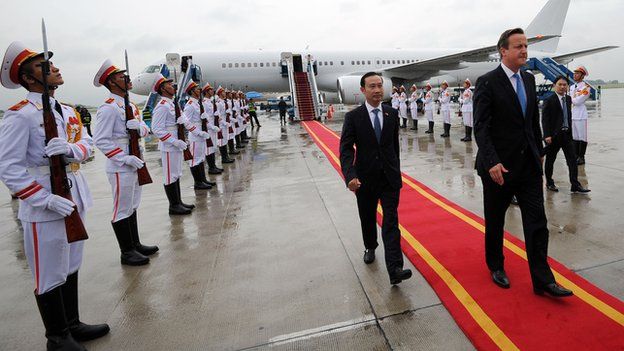Slave labour: David Cameron vows to end 'abhorrent trade'
- Published

David Cameron vowed to stamp out the "abhorrent trade" of human trafficking as he unveiled a new rules for British businesses to tackle the problem.
Large companies will be forced to prove what they are doing to stop slavery and trafficking in their supply chains.
Mr Cameron was speaking as he became the first serving British prime minister to visit Vietnam.
The south-east Asian country is one of the main source countries for victims of human trafficking in the UK.
The PM said those responsible would face "tougher sanctions".
The new rules, which will apply to more than 12,000 firms with a turnover of £36m or more, will begin in October.
Under the measures - which are part of the Modern Slavery Act - all large companies will be required to publish an annual statement setting out what steps they are taking to ensure that slave labour is not being used.
Mr Cameron will use his trip to offer extra co-operation with the Vietnamese authorities to combat human trafficking.
About 3,000 children from the country are thought to be working in British cannabis farms and nail bars.
He said: "It is shocking that thousands of Vietnamese children in the UK are being used for profit by criminal gangs and that dozens more children are estimated to arrive on our shores every month.
"That's why it's so important that we work with Vietnam to identify what more we can do to tackle this issue together."
The government has also promised funding for an additional shelter for survivors of trafficking, particularly women or children, help to prevent people falling into the grips of people smugglers in the first place and an information campaign in provinces of Vietnam where it is a particular concern.
Aidan McQuade, director of Anti Slavery International, said a large proportion of clothing, particularly cotton, had some element of slave labour involved in its production.
"We are all tied up in the webs that ultimately have forced labour and slavery within them," he said.
But while he welcomed the government's plans he said there were a number of loopholes that needed to be closed including the fact that overseas subsidiaries of UK companies did not have to comply.
- Published27 August 2013